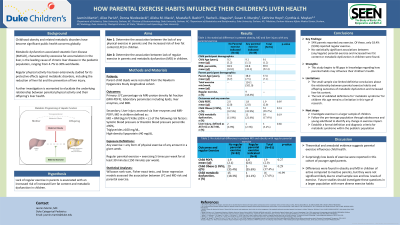Monday Poster Session
Category: Liver
P2906 - How Parental Exercise Habits Influence Their Children's Liver Health
Monday, October 28, 2024
10:30 AM - 4:00 PM ET
Location: Exhibit Hall E

Has Audio

Jasmin Martin, MD
Duke University
Durham, NC
Presenting Author(s)
Jasmin Martin, MD, Alice Parish, , Donna Niedzwiecki, PhD, Cynthia Moylan, MD
Duke University, Durham, NC
Introduction: Metabolic dysfunction-associated steatotic liver disease (MASLD), characterized by increased liver fat content (LFC), is an increasing health problem among children worldwide. Emerging evidence suggests that parental lifestyle plays a crucial role in influencing the risk of MASLD and metabolic dysfunction (MD) in offspring. We hypothesized that parental exercise could influence intergenerational transmission and risk for increased LFC and MD in children.
Methods: Parent-child dyads were recruited from the Newborn Epigenetics Study longitudinal cohort. MD in children was estimated via LFC using magnetic resonance proton density fat fraction (MRI-PDFF), laboratory parameters including lipids and alanine aminotransferase levels measured from fasting venous blood, and body mass index. Regular parental exercise was defined by exercising five times per week for at least 30 minutes. Wilcoxon rank-sum and Fisher exact tests and linear regression models were used to assess the association between LFC and MD risk and parental exercise. MD was defined as BMI percentile ≥95% plus at least one of the following risk factors: systolic SBP or diastolic BP percentile ≥90%, TG ≥100, HDL ≤40.
Results: Of the 91 parent-child dyads in this study, 49 parents reported exercising, of which 9 exercised regularly. From the model with any parental exercise as the sole predictor and PDFF as the outcome, we found that parental exercise is not a significant predictor of PDFF (β= -0.20, 95% CI: -0.65, 0.25; p=0.38). Also, 17.6% of children met our definition for MD, but there was no significant association between MD and any parental exercise habits (p=0.19) or regular parental exercise (p >0.99). There was no significant association between child obesity and any parental exercise (p=0.24) or regular parental exercise (p=0.29).
Discussion: The differences observed between the children of parents who exercise and those who do not were not statistically significant. Therefore, we cannot draw definitive conclusions about the relationship between parental exercise habits and offspring outcomes based on the available data. The main limitation of these results is the low incidence of each categorical outcome. There is no clear definition of ‘metabolic syndrome’ in children from the literature. A strength of this study is the expansive data collection to describe the children’s metabolic features, which starts to fill in the gaps in literature.
Note: The table for this abstract can be viewed in the ePoster Gallery section of the ACG 2024 ePoster Site or in The American Journal of Gastroenterology's abstract supplement issue, both of which will be available starting October 27, 2024.
Disclosures:
Jasmin Martin, MD, Alice Parish, , Donna Niedzwiecki, PhD, Cynthia Moylan, MD. P2906 - How Parental Exercise Habits Influence Their Children's Liver Health, ACG 2024 Annual Scientific Meeting Abstracts. Philadelphia, PA: American College of Gastroenterology.
Duke University, Durham, NC
Introduction: Metabolic dysfunction-associated steatotic liver disease (MASLD), characterized by increased liver fat content (LFC), is an increasing health problem among children worldwide. Emerging evidence suggests that parental lifestyle plays a crucial role in influencing the risk of MASLD and metabolic dysfunction (MD) in offspring. We hypothesized that parental exercise could influence intergenerational transmission and risk for increased LFC and MD in children.
Methods: Parent-child dyads were recruited from the Newborn Epigenetics Study longitudinal cohort. MD in children was estimated via LFC using magnetic resonance proton density fat fraction (MRI-PDFF), laboratory parameters including lipids and alanine aminotransferase levels measured from fasting venous blood, and body mass index. Regular parental exercise was defined by exercising five times per week for at least 30 minutes. Wilcoxon rank-sum and Fisher exact tests and linear regression models were used to assess the association between LFC and MD risk and parental exercise. MD was defined as BMI percentile ≥95% plus at least one of the following risk factors: systolic SBP or diastolic BP percentile ≥90%, TG ≥100, HDL ≤40.
Results: Of the 91 parent-child dyads in this study, 49 parents reported exercising, of which 9 exercised regularly. From the model with any parental exercise as the sole predictor and PDFF as the outcome, we found that parental exercise is not a significant predictor of PDFF (β= -0.20, 95% CI: -0.65, 0.25; p=0.38). Also, 17.6% of children met our definition for MD, but there was no significant association between MD and any parental exercise habits (p=0.19) or regular parental exercise (p >0.99). There was no significant association between child obesity and any parental exercise (p=0.24) or regular parental exercise (p=0.29).
Discussion: The differences observed between the children of parents who exercise and those who do not were not statistically significant. Therefore, we cannot draw definitive conclusions about the relationship between parental exercise habits and offspring outcomes based on the available data. The main limitation of these results is the low incidence of each categorical outcome. There is no clear definition of ‘metabolic syndrome’ in children from the literature. A strength of this study is the expansive data collection to describe the children’s metabolic features, which starts to fill in the gaps in literature.
Note: The table for this abstract can be viewed in the ePoster Gallery section of the ACG 2024 ePoster Site or in The American Journal of Gastroenterology's abstract supplement issue, both of which will be available starting October 27, 2024.
Disclosures:
Jasmin Martin indicated no relevant financial relationships.
Alice Parish indicated no relevant financial relationships.
Donna Niedzwiecki indicated no relevant financial relationships.
Cynthia Moylan indicated no relevant financial relationships.
Jasmin Martin, MD, Alice Parish, , Donna Niedzwiecki, PhD, Cynthia Moylan, MD. P2906 - How Parental Exercise Habits Influence Their Children's Liver Health, ACG 2024 Annual Scientific Meeting Abstracts. Philadelphia, PA: American College of Gastroenterology.
